Comparing On Cloud vs Nike running shoes is another really interesting running shoe comparison. Nike is the long time behemoth with so much marketing and experience, while Cloud running is breaking the old school mold.
Over the years, I’ve tested models from both brands to give you some personal insight along with basic shoe details. Hopefully the combination of my trials, plus the info about different shoes will help you make a selection.
We’ve got details on construction, fit, feel, fabric and more. But ultimately it’s really the feel on your foot that’s going to make the decision.
Nike Vs On Cloud Key Differences
On Cloud and Nike offer a lot of similar features and models for all kinds of runners. There are options for moderate to max cushion and overpronation.
I would say neither brand is super high on the list of shoes that ultramarathon runners love, unlike the Hoka.
Nike has been around forever and is a long standing favorite of running stores and distance runners alike.
Meanwhile, On took hold in the triathlon market first and then quickly moved mainstream running.
I break down the differences in more detail below, but here’s a quick overview:
Nike Running Shoes
- More narrow fit, especially in the heel and midsole
- Tend to run smaller in width and length than many other brands
- A larger focus on newest and trendiest technology to “improve running economy”
- Known across a wide variety of sports and highly visible in competition
- Loves to be high fashion
- Has a large brand loyal following
On Running Shoes
- Newer styles are a more average fit, some slightly wide
- Recognizable sole with the pods
- Claims their CloudTec sole reduces muscle fatigue and lowers HR
- Focus on improving speed off ground and reducing impact
- Mostly running shoes, but now has incredible jackets, pants, etc as well
If you’re looking for just a detailed look a On, checkout this full On Cloud Review >>
I’ve worn both brands and will add some personal thoughts, along with links to detailed reviews. Here you’ve got two of my well worn models!
ON Running vs Nike Feature Comparison
While ON is newer to the running market, Nike has a long history that often makes it hard for many runners to switch to the newer style.
Both offer options to aid with comfort, support, stability, and cushion. Where they differ most are in the feel and fit of the shoe while running.
The following breaks down each shoe based on the components buyers need to consider when purchasing a running shoe.
It’s gonna get a little TECHY…so you can just skip on down to the specific model comparison if you want, but personally if I’m shelling out $150 for shoes, I kinda want to know why.
Durability
The lifespan of shoes from both companies is fairly comparable.
- On recommends swapping out for new shoes every 310 to 465 miles, a bit more specific than most brands.
- Nike’s Vapor Fly is only going to give you about 200 miles, but most shoes are in the 300-500 mile range. (I will say some of my favorite Nike’s are definitely on the lower end of lifespan compared to other shoes.)
Determining when to replace running shoes, of course, all depends on your gait, weight, and whether you run mostly on trail or road.
Shoe Fit
On shoes are a little hard for me to describe because I think they’ve changed over the last few years and are different with each model that I’ve tested.
While the length runs true to size, I would say some are a narrow fit and some have a little more room in the toebox.
I would not consider any of them a wide shoe. I’ve also run in to issues with the toebox being stiff and therefore feeling like it’s creasing on my foot when I push off. This hasn’t happen with newer models, so could have been growing pains in the brand or simply a shoe that wasn’t the right fit for me.
Nike running shoes are often reported to run small. I would say this is hit or miss for me. Some shoes seem totally fine and others, I absolutely wish I had a half size up. No rhyme or reason to which shoe I notice it most in.
They do not offer the variety of widths that you’ll see with New Balance. But if you like the fit, you’ll find it fairly consistent across models.
Cushioning
On uses CloudTec technology which is entirely what makes their shoe look and feel different. They have little open pockets on the bottom of the shoe that compress with each step to absorb impact and in their words feel like a cloud.
I would say they are cushioned, but not plush.

Nike started putting air in their shoes back in 1977 to improve cushioning.
“Nike Air technology consists of pressurized air inside a tough yet flexible bag and provides more spring without compromising the structure.”
And since the 90’s they’ve been recycling waste material from production in to new shoes. They continue to look at this sustainability in developing new shoes.
However now, their big thing is ZOOMX foam. I wrote about it in-depth on the Nike Invincible review.
Nike ZoomX cushioning is Nike’s latest innovation in running technology.
It’s a cushioning system that provides lightweight, responsive cushioning for a faster and more comfortable ride.
Made from a unique foam material that is 30% lighter than traditional foam and is designed to provide maximum energy return, allowing runners to go farther and faster. The foam also provides a softer landing and smoother transitions from heel to toe.
Stability
On goes against the grain of most stability shoes and works with your foots motion rather than trying to stop it. I appreciate this as it’s one of the many reasons I steer folks away from most stability shoes.
Instead, they changed the shape and location of some of the pieces under the arch of the foot which allows all of your muscles to continue firing, but slows that inward roll.
Nike does say their stability shoes are slightly wider and also designed with a curve that will help with heel to toe transitions.
As you may know, I’m not a huge fan of stability shoes for most runners. I am not finding a big difference in brands, they are all focused on preventing that foot roll and often feel a little stiffer

Overview of heel to toe drop and type of cushion in most shoe brands.
Affordability
The prices between the two brands are fairly comparable.
- On prices range between $130 to $170
- Nike start at $120 to $180
Specialty items with more features (like carbon plates) will increase price.
You’ll notice that every brand offers a range and this is indeed due to a difference in technology and where they sell the shoe. They know that the big box store can sell the shoe with less in it, while the local running store needs to be best for dedicated runners.
Nike Vs On Cloud Running Shoes
Now that you know more about each brand, let’s look at their top models in each of the main categories. There’s no winner declared here because all are great shoes, it’s just about which one is best for your foot.
With each of these, they are the top models so numbers are constantly changing as they make a little upgrade, but On doesn’t keep adding numbers to the shoe name like most brands doe.
Quick note, I absolutely encourage you to checkout Nike’s return policy! It makes it much easier to test out a shoe and return if it doesn’t feel right.
Stability Running Shoe
👉On Cloudrunner
The Cloudrunner 2 is one of the few daily trainers that doubles as a mild stability shoe. Not that there aren’t plenty of stability options that you all love like the Glycerin GTS, but this one could pass as a neutral shoe with some elements that help stability. And that is something we can get behind.
Unlike many really firm stability shoes or some of the new max cushioned shoes, this remains in that moderate sweet spot for many. Consider it a middle child to the old hard On shoes that Coach Amanda hated and the new cushy soft On Cloudsurfer.
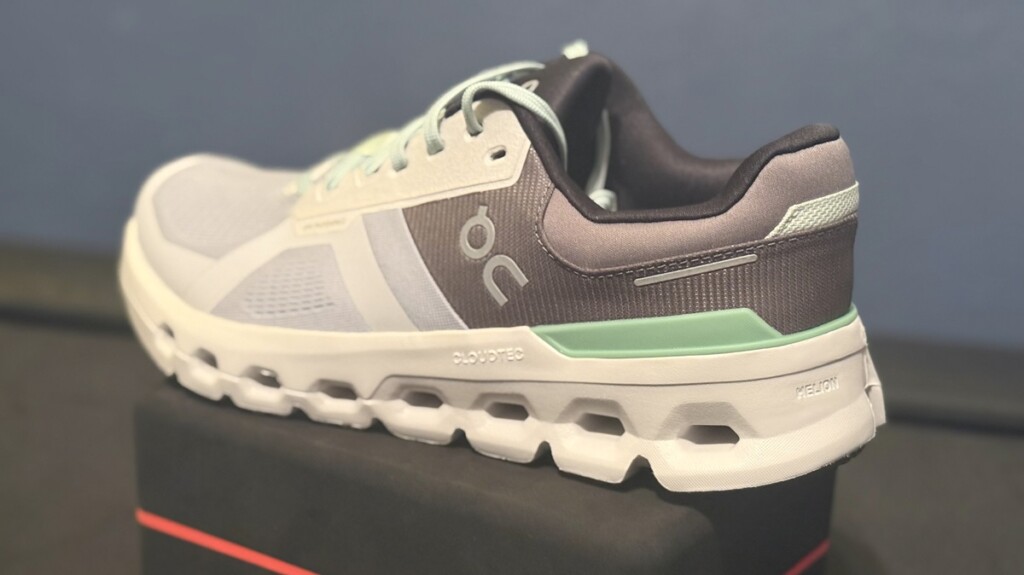
- Weight: 9.7 oz (Men), 8.5 oz (Women)
- Heel Drop: 10mm
- 2 colors availalbe
- Available in wide
- Available at On.com for $110
- Read our full On Cloudrunner 2 review >>
👉Nike Structure 26
Nike has updated their line up and you’ll find that the Structure is their new series for stability shoes, replacing the Invincible line up. According to Nike, the Structure 26 is the go-to choice for runners seeking stability and cushioning. They removed the previous models AirZoom profile and added a full length ReactX midsole. 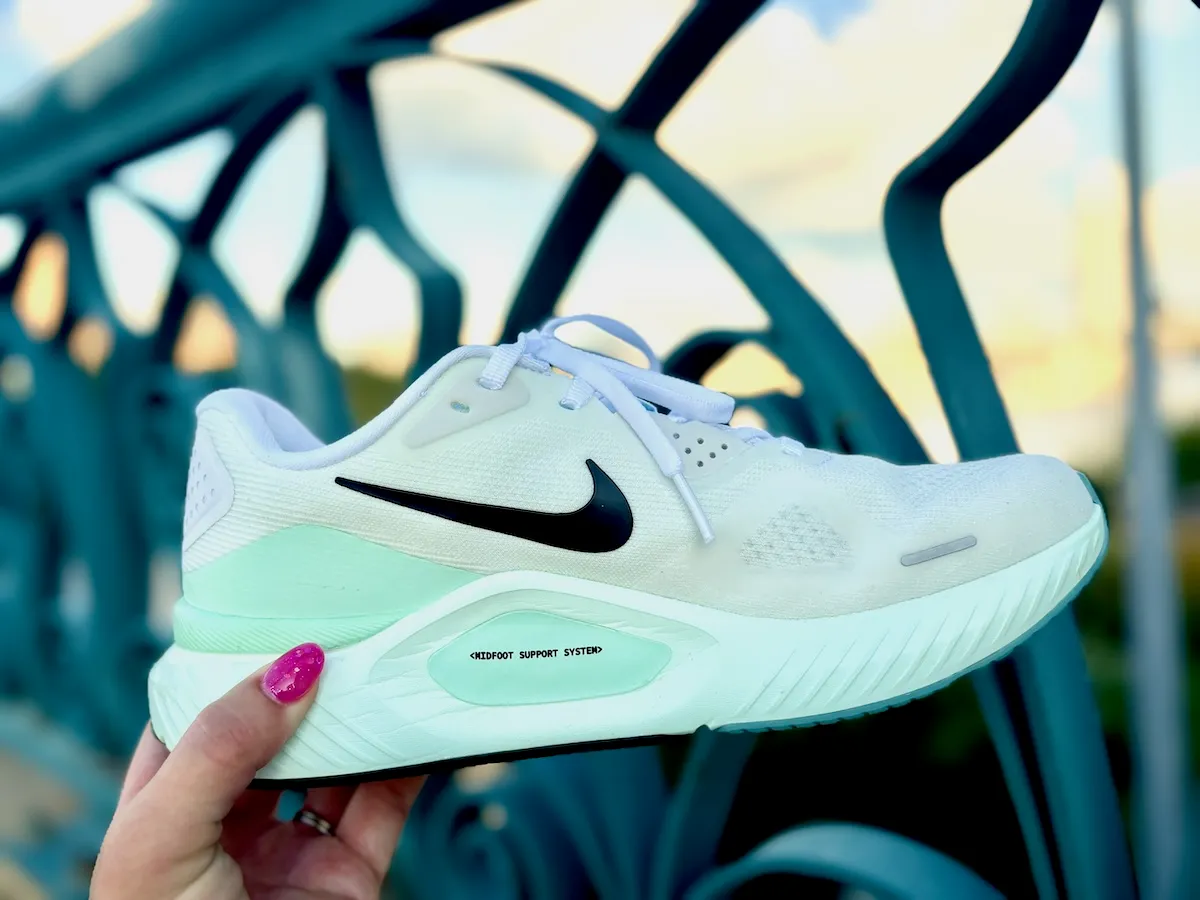 In terms of support, Nike has shifted away from rigid posts and instead uses its Midfoot Support System, which wraps the foot in two areas; the lateral rear heel and the medial midfoot. This delivers guidance and stability without ever feeling overbearing.
In terms of support, Nike has shifted away from rigid posts and instead uses its Midfoot Support System, which wraps the foot in two areas; the lateral rear heel and the medial midfoot. This delivers guidance and stability without ever feeling overbearing.
And you’ll appreciate that support, because the Structure 26 carries its highest stack height to date—38 mm in the heel with a 10mm drop.
- Weight: 11.3 oz Men’s, 9.2 oz Women’s
- Stack Height: 38mm
- Heel Drop: 10 mm
- Available in 6 Colors
- Available in wide
- Available on nike.com for $145
- Checkout our full review of the Nike Structure 26 >>
Neutral Running Shoe
👉On Cloudsurfer
This latest shoe combines soft, cushioned foam in the midsole, a redesigned upper and a firm rubber outsole. I was pleasantly surprised with how comfortable the footbed felt the first time I tried these on, and that had me constantly coming back for more.
Cloudsurfer 2 is a moderate cushioned, lower stack height, running shoe for shorter easy runs that’s also high on our list of great walking shoes.
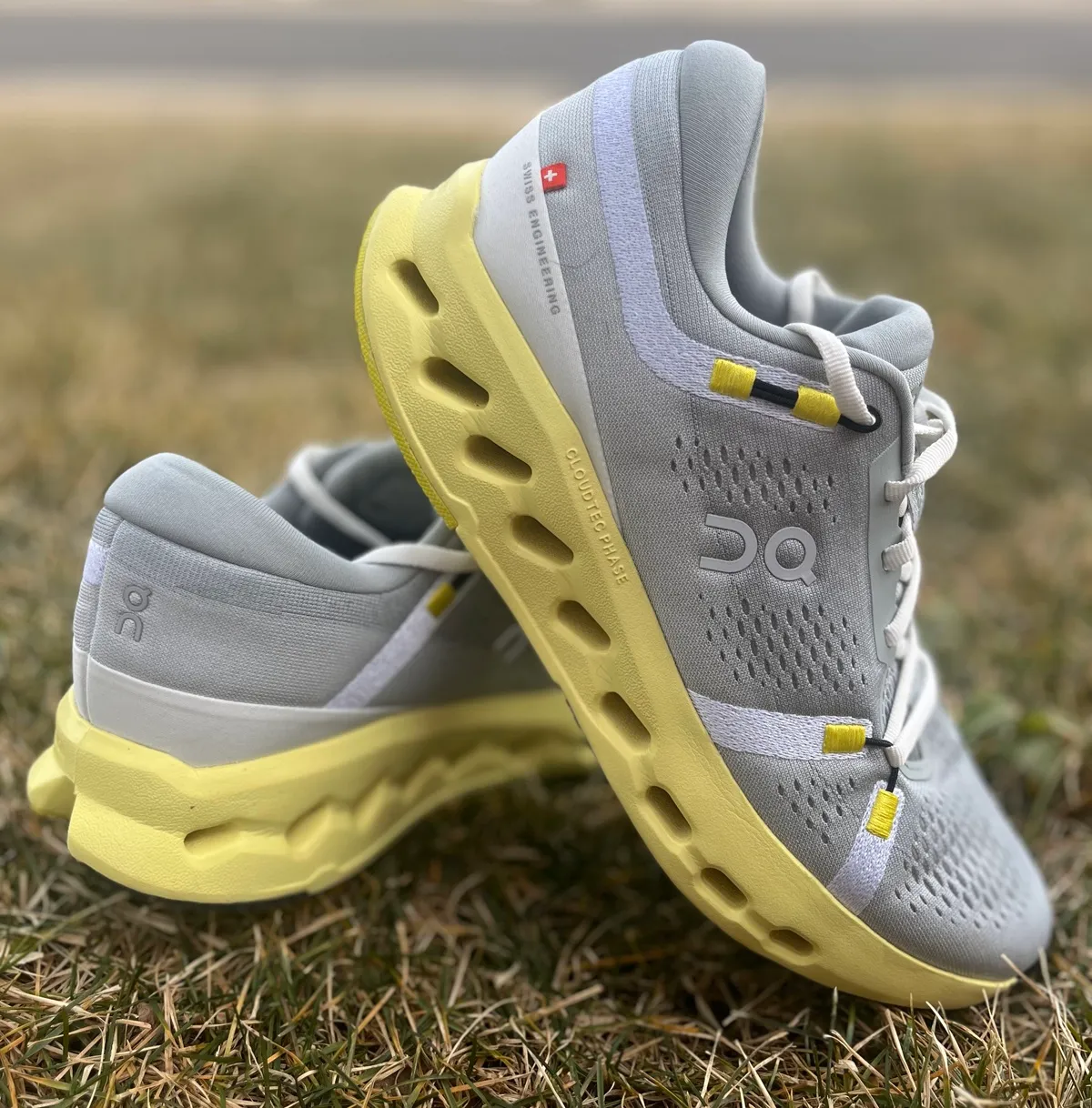
For a daily trainer, these have the right amount of energy return and cushion while feeling breathable and secure on your feet. The cushioned midsole of these shoes isn’t overly plush, which does feel like a departure from prior Cloudsurfer models. The changes to this shoe’s midsole still feel extremely comfortable.
At 9oz, the Cloudsurfer 2 is lightweight but feels supportive enough to protect you through a variety of runs. It balances performance with weight in a way that makes this a reliable, smooth trainer.
- Weight: 7.9 oz women’s, 9.2 oz men’s
- Heel drop: 9mm
- Available in 4 colors
- Available at On Running for $160
- Read our full review of the On Cloudsurfer 2 here >>
👉Nike Pegasus 41
The Nike Pegasus has all the bells and whistles that a runner could ask for: just the right amount of cushion in midsole for maximum comfort, durable rubber outsole to withstand, and a breathable mesh upper to keep your feet feeling fresh and dry.
But let’s get real for a second. The Nike Pegasus isn’t just a pretty shoe. It’s got substance too, with a firm heel counter that keeps your foot locked in place and a molded foam insole that provides extra support for those long runs.
This is a good option for your easy weekday runs or for the support of a marathon training run.
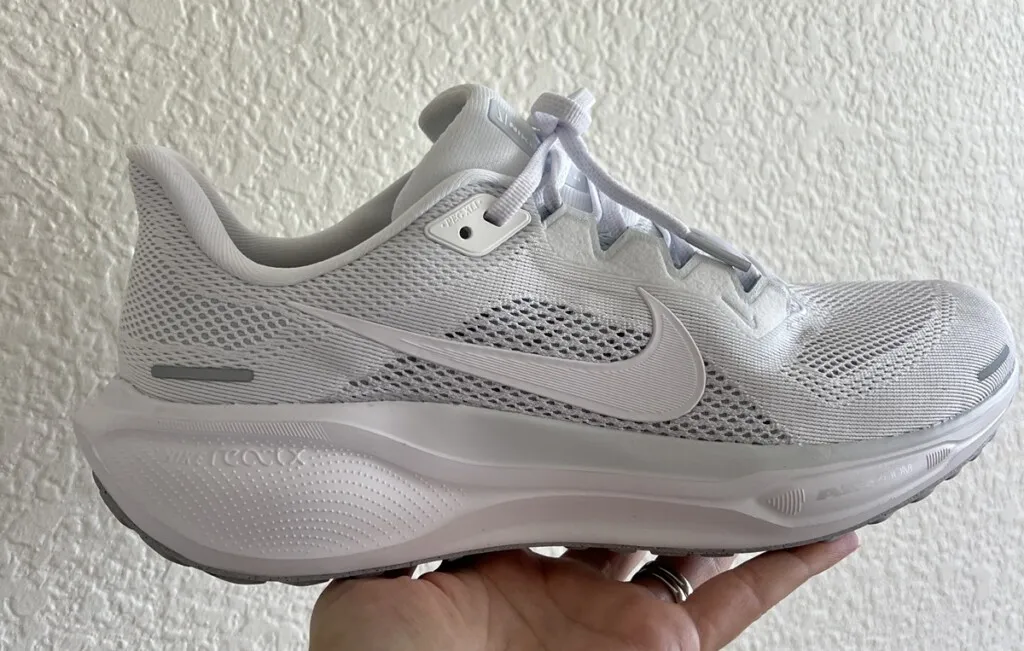
This is definitely a shoe that I like for those weekday training runs. Not over built, just enough cushion and a little roomier than other Nike’s.
- Weight: 10.4 oz men’s, 8.6 oz women’s
- Heel drop: 10mm
- 14 (!!) colors available
- Available in Extra Wide
- Find it here on Nike.com for $140, so you can enjoy their 30 day trial policy!
- See complete Nike Pegasus 41 Review here >>
Cushioned Running Shoe
👉Cloudmonster
This is not a max cushioned shoe, but a good moderate cushion that works for a lot of different runs. That being said, I know they are moving towards the On Cloudsurfer Max as a 2025 release to be their max shoe.
This was one of the first On shoes that immediately got me hooked. I have now been running in it for over a year and continue to like that this shoe isn’t super squishy soft, but isn’t hard like previous On Running shoes. I always try to compare it to the HOKA Bondi, which feels like you put your foot in a cloud and this is not that kind of soft, it’s also not the Vaporfly bouncy kind of soft. For On the cushion is more about the absorbing of impact, rather than what you might think of as traditional cushion. That’s not a bad thing, just different expectations.
I always try to compare it to the HOKA Bondi, which feels like you put your foot in a cloud and this is not that kind of soft, it’s also not the Vaporfly bouncy kind of soft. For On the cushion is more about the absorbing of impact, rather than what you might think of as traditional cushion. That’s not a bad thing, just different expectations.
This absolutely felt like the most cushioned On running shoe I’ve tested for long runs. It’s not too soft, just a nice cushion. Making it a good daily easy run trainer. Then of course they released the On Cloudeclipse and it’s definitely next level max cushion, but being replaced as noted above.
- Weight: 8.11 oz women’s, 9.70 oz men’s
- Heel Drop: 6mm
- Available in 2 colors
- Not available in wide
- Available at On Running retail stores for $170
- Read my full review of the On Cloud Monster
👉Nike Vomero 18
My friends this shoe is a jaw dropper. A massive update to their previous models and we LOVE IT. This is max cushion done in a way that just feels good mile after mile and honestly while the weight listed is high, we just didn’t notice it at all while running.
At a whopping 46mm heel stack height, you will absolutely know this is a cushioned running shoe. It doesn’t feel unstable, but also not as stable as some shoes with a wider midsole flare. 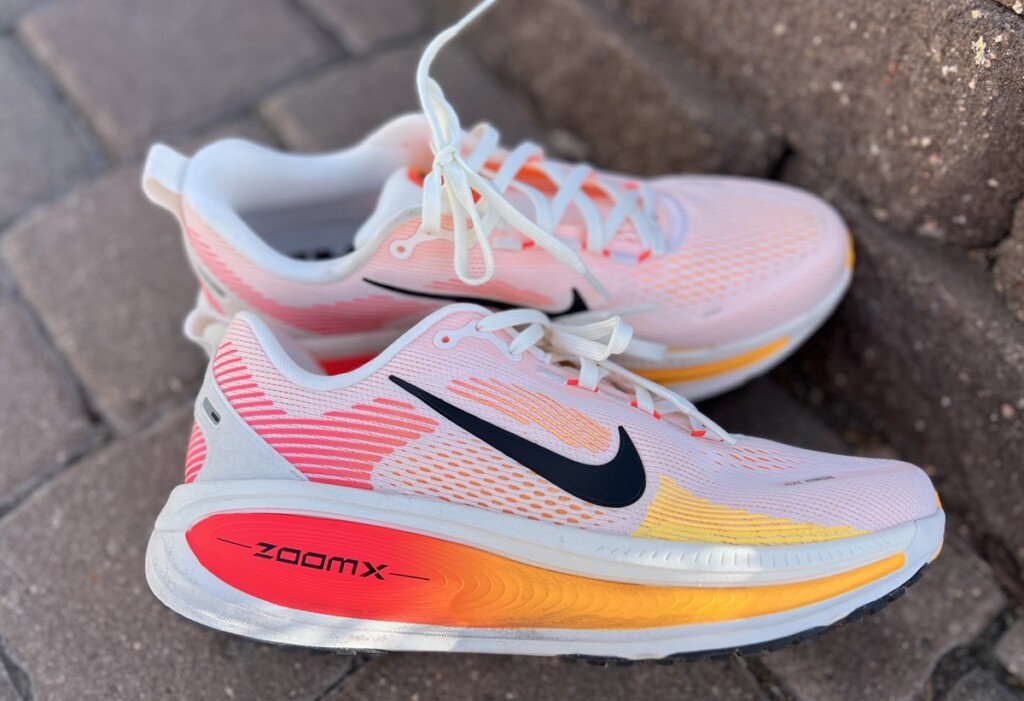 This is going to be a cushioned shoe for all those long easy runs and for many runners to cover the full 26.2 distance comfortably.
This is going to be a cushioned shoe for all those long easy runs and for many runners to cover the full 26.2 distance comfortably.
Again, watch to see a Premium and a Plus version of this shoe coming as they streamline their categories.
- Weight: 9.3 oz women’s, 11.5 oz men’s
- Heel toe drop: 10mm
- Available in 6 colors
- Not available in Wide
- Available at Nike.com $150
- Read our full review of the Nike Vomero 18 here >>
Checkout our full list of our most recent cushioned shoe reviews to see what else may be a perfect match.
Carbon Fiber Plate Shoes
Are they cool new technology, yes.
Do they last as long as your other shoes, nope.
So if you want to test these out use them for speed work and then race day!
👉Nike ZoomX VaporFly 4
The Vaporfly has been interesting over the years because it’s not unusual for one person to love a model an someone else to love the previous model. In testing the 3, I was frustrated with the outsole and it looks like that hasn’t had much of an update here. So durability is still a concern.
That being said the 4 is fast and light and another iteration of speed. It’s always had the feeling of running on rails and being narrow, that continues here and is maybe even a smidge more noticeable.
The ride is smooth and fast, but if you tend to overpronate or want more support on longer efforts, your ankles might have to work a little harder to keep everything lined up. For this reason you may prefer the Alphafly in the marathon distance.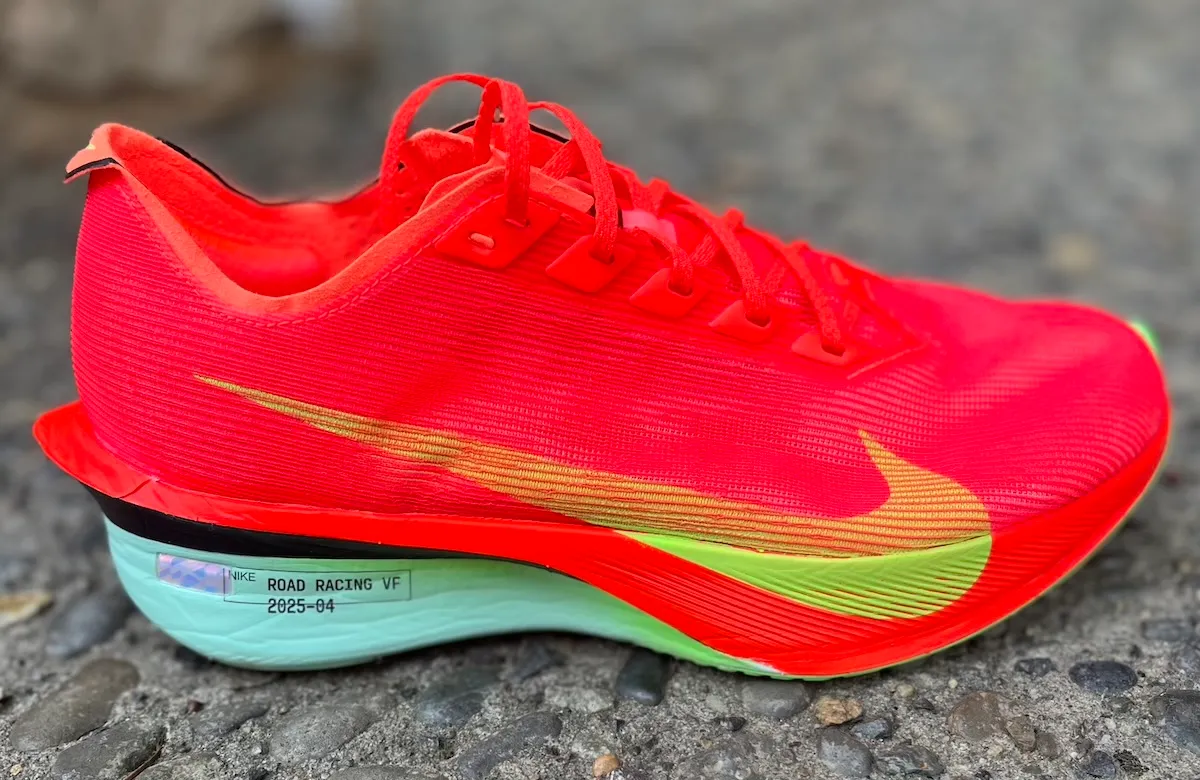
And more importantly a comparison of the Nike Alphafly vs Vaporfly. Which is the right race shoe for you?
- Weight: 6.7 oz Men’s, 5.3 oz Women’s (Unisex sizing)
- Heel Drop: 6 mm
- Available in 3 colors
- Not available in wide
- Available on Nike.com $260
- Read our full review of the Nike Vaporfly 4 here >>
👉On Cloudboom Strike
After seeing Helen Obiri win Boston, a lot of runners stood up to take notice of what On was doing with carbon fiber. It’s a very different type of shoe than Nike and for a lot of runners, that’s a good thing.
Slipping on the On Cloudboom Strike, I could tell right away a lot of things had changed from the first model in 2020. Changed for the better!
- Increased cushion for distance running
- No pods along the bottom to collect rocks
- Better overall fit and foot room
This shoe has a wider fit than say the Vaporfly and even with the high stack, has a pretty stable feel. We really like the overall bounce and energy you get from this model.
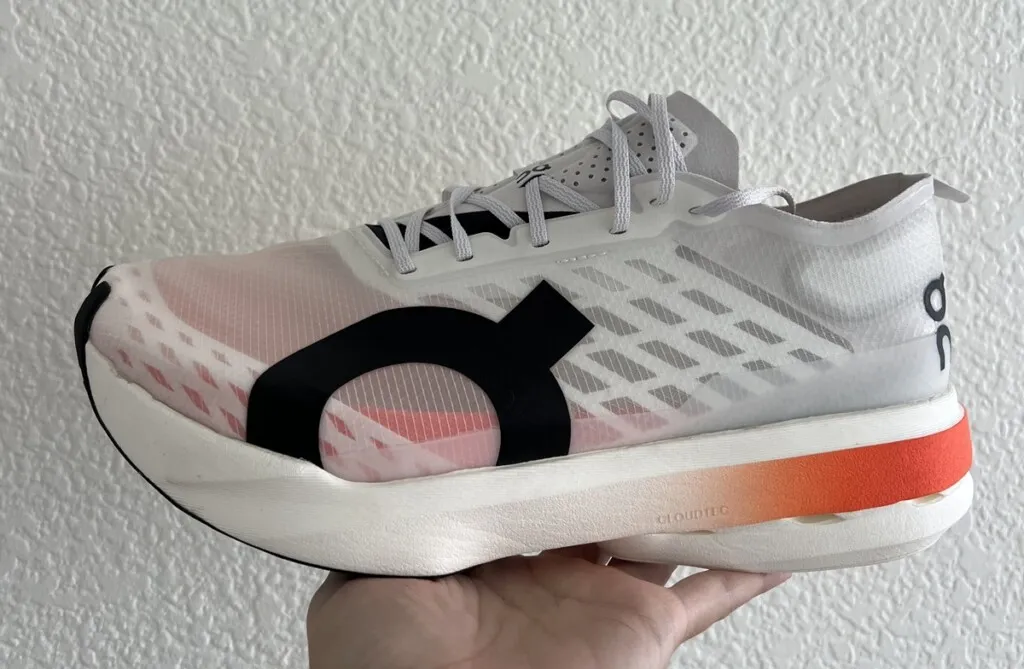
- Weight: 6.8 women’s, 7.7 men’s
- Heel drop: 4mm
- Available in 2 colors
- Not available in wide
- Available at On Running for $280
- Detailed review of the On Cloudboom Strike >>
Watch my detailed video on how Carbon Fiber Shoes work.
Trail Running Shoes
On is a little newer to the trail running shoe game, but if you already enjoy their road shoes then you’ll find they’ve done a good job on the Ultra. Nike meanwhile actually has a pretty wide range of shoes here.
👉Nike Kieger
Compared to many of the trail shoes I’ve run in this is a bit more minimal on the cushion side, and yet it’s a shoe I really like and have used for quite awhile.
While this shoe has a rockplate, I’d still relegate it to my mid-distance or faster trail style running, not my super big rock kind of days. I’m a big fan of the lower profile and the Epic react cushioning (see info below).
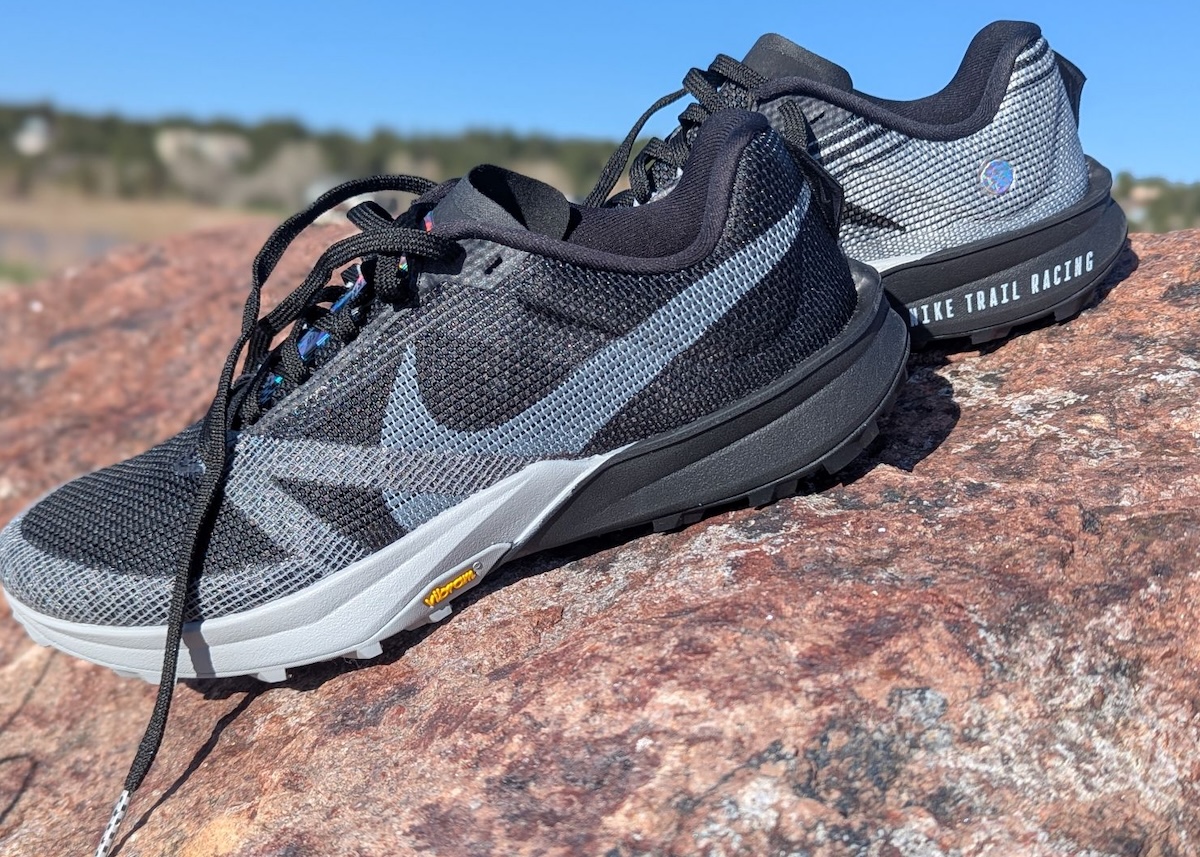
Some noted that they didn’t like the feel of the shoe on hard packed trails, but I can’t say I minded. Again simply knowing upfront that this is trail running shoe that’s going to be moderately cushioned and responsive.
The grip felt good in most places, thoughthe lugs are not huge or varied on the forefoot, so for more technical terrain you might choose another option. I’ve heard it doesn’t grip well when wet, but I wasn’t on anything slick enough to find that as an issue.
- Weight: uni-sex, approximately 9.8 oz men’s
- Heel Drop: 5 mm
- Colors: 4 colors available
- Not available in wide
- Available on Nike.com for $170
- Read our full review of the Nike Terra Kiger 10 here >>
👉On Cloudultra
Welcome to their trail shoe with the highest amount of cushioning. The flip release on the shoe laces, also makes it easy to adjust the tigthness of the shoes. Which as we know is often needed during ultras when feet swell.
The On Cloudultra is one of On Running’s newest trail running shoes and an excellent addition to the ultramarathon and endurance trail running market.
Partially because they shifted the pod set up, so you will catch less rocks than with the road shoes!! They add lugs for more grip and took the pods way, way down.
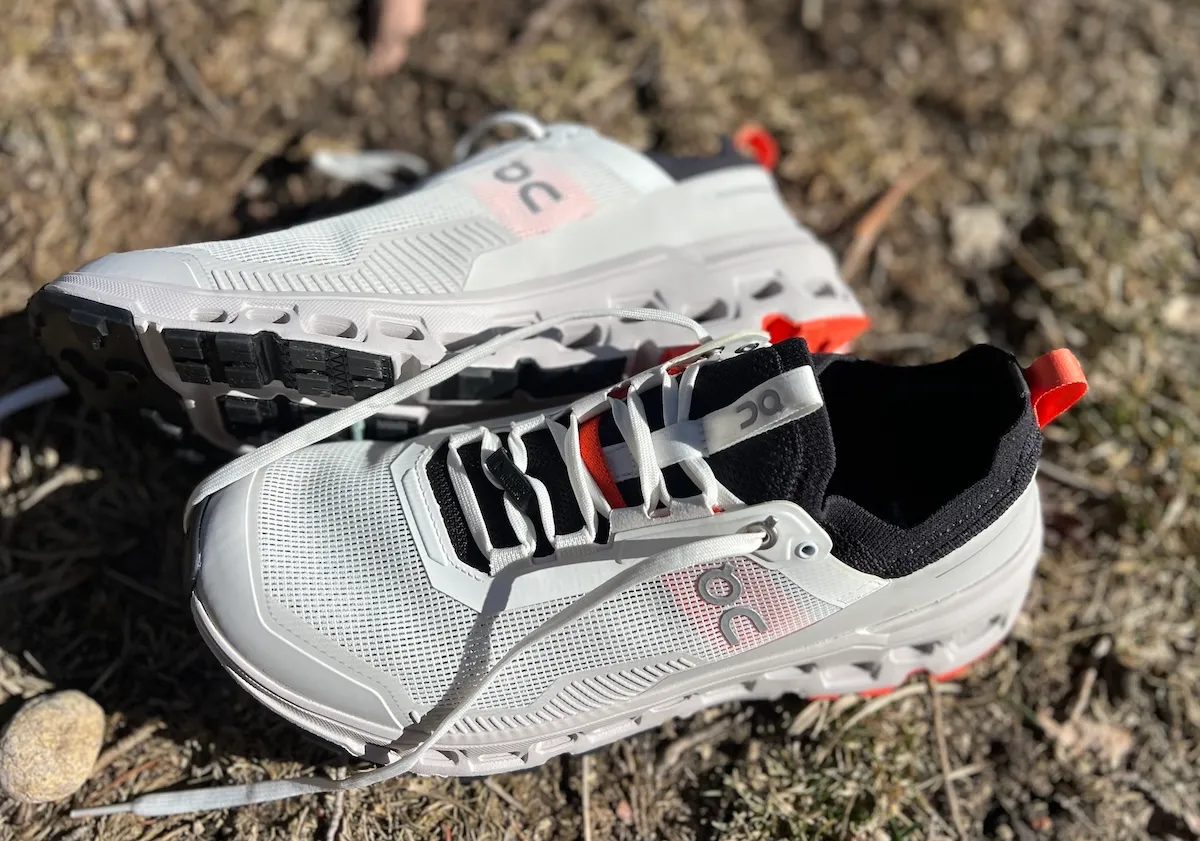
On has satisfied the request of thousands of trail runners with this shoe, thanks to its ability to tackle tricky terrain effectively and remain comfortable over long distances on trails and highways with its Helion midsole foam.
These are excellent trail running footwear for all distances up to and including the marathon.
- Weight: 10.4 oz Men’s, 9.3 oz Women’s
- Heel drop: 5mm
- 4 colors available
- Not available in wide
- Available from On.com for $180
- Check our full review of the On Cloud Ultra 2 here >>
How to Choose On or Nike Running Shoes?
Now that we’ve gone through the different models, you have a better feeling for what sets each apart. I can’t recommend enough that you buy knowing you can take them out for a few runs and return.
And remember: Your gait and feet will likely change over time and you may need to change shoes.
This is also why I recommend rotating through several pairs of shoes at once.
Keep in mind that shoe design can change, even with the same model, so always assess how the shoe fits every time you replace a pair.
What to read next:
Other ways to connect with Amanda
Instagram Daily Fun: RunToTheFinish
Facebook Community Chatter: RunToTheFinish
Sign Up to Receive a Weekly Newsletter with Top Running Tips and Laughs



 Saucony vs Hoka Running Shoes
Saucony vs Hoka Running Shoes